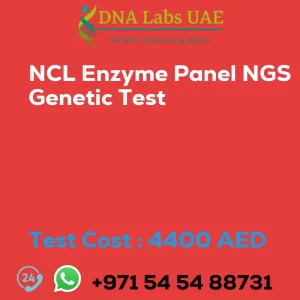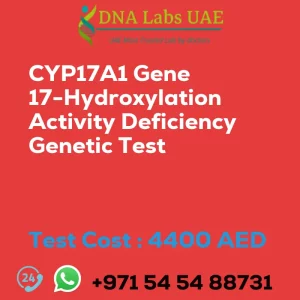GCDH Gene Glutaric acidemia type 1 Genetic Test
Test Details
The GCDH gene is associated with a condition called glutaric acidemia type 1 (GA1). GA1 is an inherited metabolic disorder that affects the body’s ability to break down certain amino acids, specifically lysine, hydroxylysine, and tryptophan. This leads to a buildup of toxic substances, such as glutaric acid, in the body.
NGS (Next-Generation Sequencing) genetic testing is a method used to analyze multiple genes simultaneously. In the case of GA1, NGS genetic testing can be used to identify mutations or variations in the GCDH gene that may be responsible for the condition. This type of testing can provide a comprehensive analysis of the entire gene, allowing for a more accurate diagnosis of GA1.
NGS genetic testing is often recommended for individuals with suspected GA1 or those who have a family history of the condition. It can help confirm a diagnosis, provide information about the specific genetic mutation involved, and assist in determining the best treatment and management options for the individual.
It’s important to note that genetic testing should be performed and interpreted by a qualified healthcare professional or genetic counselor, as they can provide guidance on the implications of the test results and any necessary follow-up actions.
Test Name
GCDH Gene Glutaric acidemia type 1 Genetic Test
Components
Price: 4400.0 AED
Sample Condition
Blood or Extracted DNA or One drop Blood on FTA Card
Report Delivery
3 to 4 Weeks
Method
NGS Technology
Test Type
Metabolic Disorders
Doctor
General Physician
Test Department
Genetics
Pre Test Information
Clinical History of Patient who is going for GCDH Gene Glutaric acidemia type 1 NGS Genetic DNA Test
A Genetic Counselling session to draw a pedigree chart of family members affected with Glutaric acidemia type 1
| Test Name | GCDH Gene Glutaric acidemia type 1 Genetic Test |
|---|---|
| Components | |
| Price | 4400.0 AED |
| Sample Condition | Blood or Extracted DNA or One drop Blood on FTA Card |
| Report Delivery | 3 to 4 Weeks |
| Method | NGS Technology |
| Test type | Metabolic Disorders |
| Doctor | General Physician |
| Test Department: | Genetics |
| Pre Test Information | Clinical History of Patient who is going for GCDH Gene Glutaric acidemia type 1 NGS Genetic DNA Test A Genetic Counselling session to draw a pedigree chart of family members affected with Glutaric acidemia type 1 |
| Test Details |
The GCDH gene is associated with a condition called glutaric acidemia type 1 (GA1). GA1 is an inherited metabolic disorder that affects the body’s ability to break down certain amino acids, specifically lysine, hydroxylysine, and tryptophan. This leads to a buildup of toxic substances, such as glutaric acid, in the body. NGS (Next-Generation Sequencing) genetic testing is a method used to analyze multiple genes simultaneously. In the case of GA1, NGS genetic testing can be used to identify mutations or variations in the GCDH gene that may be responsible for the condition. This type of testing can provide a comprehensive analysis of the entire gene, allowing for a more accurate diagnosis of GA1. NGS genetic testing is often recommended for individuals with suspected GA1 or those who have a family history of the condition. It can help confirm a diagnosis, provide information about the specific genetic mutation involved, and assist in determining the best treatment and management options for the individual. It’s important to note that genetic testing should be performed and interpreted by a qualified healthcare professional or genetic counselor, as they can provide guidance on the implications of the test results and any necessary follow-up actions. |








